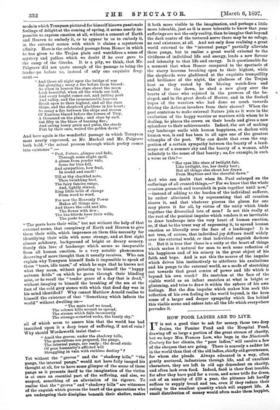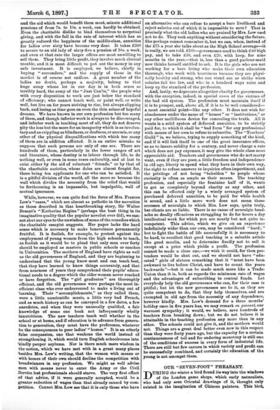HOW POOR LADIES ARE TO LIVE. and the aid which
would benefit them most, minute additional pensions of from 7s. to 10s. a week, can hardly be obtained. Even the charitable dislike to bind themselves to perpetual giving, and with the fall in the rate of interest which has so greatly reduced the happiness of the middle-class, annuities for ladies over sixty have become very dear. It takes £260 to secure to an old lady of sixty-five a pension of 10s. a week, and even at that rate the larger offices are most unwilling to sell them. They bring little profit, they involve much clerical trouble, and it is most difficult to put out the money in any safe investment. It is employed, we believe, chiefly in buying " surrenders," and the supply of these in the market is of course not endless. A great number of the ladies no doubt, perhaps a majority, belong to that huge army whose lot in our day is in both sexes so terribly hard, the army of the " Just Can'ts," the people who with every disposition to work are just below the standard of efficiency; who cannot teach well, or paint well, or write well, but live on for years striving to rise, but always slipping back, and losing as time goes on even the thin solace of hopeful dreams. We have known in our own profession but too many of them, and though inferior work is always to be discouraged, and inferior work in teaching most of all, they do not deserve pity the less but the more for an incapacity which is as involun- tary and as crippling as blindness, or deafness, or anaemia, or any other of the physical disqualifications with which too many -of them are in addition afflicted. It is an entire mistake to suppose that such persons are only of one sex. There are hundreds of them, particularly in the lower ranges of art -and literature, whose destiny is to labour through life, to do nothing well, or even in some cases endurably, and at last to exist either by the aid of reluctant friends," or by that of -the charitable societies, whose doles are almost fought for, there being ten applicants for one who can be satisfied. It is a pitiful division of the world, all the more so because the wall which divides the necessity from the relief that would -be forthcoming is an impassable, but impalpable, wall of mutual ignorance.
While, however, we can quite feel the force of Mrs. Frances Low's "cases," which are almost as pathetic in the narration as those described in that heartbreaking story, Sir Walter Besant's "Katherine Regina" (perhaps the best thing in its imaginative quality that the popular novelist ever did), we can- not shut our eyes to the unwisdom of some of the remedies which the charitable essayist suggests. Her paper lacks the hard sense which is necessary to make benevolence permanently fruitful. It is foolish, for example, to protest against the employment of young women from the high schools to teach, as foolish as it would be to plead that only men over forty should be employed as masters in public schools or coaches in Universities. The mothers of England have rights as well as the old governesses of England, and they are beginning to understand that the young know most and can teach best, that they have learned to know things accurately, and that from nearness of years they comprehend their pupils' educa- tional needs to a degree which the older women never reached or have forgotten. The " girl graduates" are thoroughly efficient, and the old governesses were perhaps the most in- efficient class who ever endeavoured to make a living out of 'learning. Their " accomplishments," as they called them, were a little unscientific music, a little very bad French, and as much history as can be conveyed in a few dates, a few anecdotes, and when they were unusually qualified, a fair knowledge of some one book not infrequently wholly innutritious. The new teachers teach well whether in the school or at home, and if education is to advance from genera- tion to generation, they must have the preference, whatever he the consequences to poor ladies' " homes." It is an utterly false compassion, one that weakens the world instead of strengthening it, which would turn English schoolrooms into 'kindly pauper asylums. Nor is there much more wisdom in the notion, which we have met with in a great many places 'besides Mrs. Low's writing, that the women with means or with homes of their own should decline the competition with breadwinners in any profession. We might as well advise men with means never to enter the Army or the Civil Service lest professionals should starve. The very first effect of that advice, if it were generally accepted, would be a greater reduction of wages than that already caused by com- petition. Cannot Mrs. Low see that it is only those who have an alternative who can refuse to accept a bare livelihood and reject salaries out of which it is impossible to save P That is precisely what the old ladies who are praised by Mrs. Low used not to do. They took anything without c the future. She perhaps cannot remember it, but we can, when, instead of the £75 a year she talks about as the High School average—it is really, we are told. £105—governesses used to think £40 high pay, and to take £30, and even £20, with keep, for nine months in the year,—that is, less than a good parlour-maid now thinks herself entitled to ask. It is the girls who are not working for a bare living who make their own education thorough, who work with heartiness because they are physi- cally healthy and strong, who can stand out or strike when salaries fall too low, and who in a hundred ways raise and keep up the standard of the profession.
And, lastly, we deprecate altogether charity for governesses, with the exception, indeed, in special cases of the victims of the bad old system. The profession must maintain itself if it is to prosper, and, above all, if it is to be well considered— a most essential point—like any other. It does not wish for almshouses under the name of " homes" or " institutions," or any other mellifluous device for concealing the truth. All it wants is a solid system of deferred annuities, to be strictly paid for, to which it shall be " bad form " for any professional with means of her own to refuse to subscribe. The "Teachers' Guild" is, we believe, trying to supply something of the kind, and if it will link itself to one of the great insurance offices, so as to insure solidity for a century, and never charge a rate which does not pay expenses, it may give the whole class most appreciable aid. Teachers and governesses who do not marry want, even if they are poor, a little freedom and independence in old age, liberty to spend what they have in their own way, the right to refuse answers to inquiries often impertinent, and the privilege of not being "beholden" to people whose curiosity is often as ample as their means. The teaching profession, and especially the feminine half of it, wants to get as completely beyond charity as any other, and this can be effected only by a. wisely arranged system of purchased deferred annuities, to be paid for while health is sound, and a little more work does not mean those accesses of neuralgia to which Mrs. Low says, quite truly, her clients are so liable. There is no cause of neuralgic head- ache so deadly efficacious as struggling to do for hours a day intellectual work for which you are nearly but not quite in- competent. This advice, which we give on an experience indefinitely wider than our own, may be considered " hard ; " but to fight the battle of life successfully it is necessary to be hard, to recollect that good teaching is a saleable article like good muslin, and to determine fixedly not to sell it except at a price which yields a profit. The profession cannot be made a close one,—we wish it could, for then pre- tenders would be shut out, and we should not have " edu- cated " girls of sixteen remarking that it "must have been awkward to live before Christ, and have to count the years backwards "—but it can be made much more like a Trade- Union than it is, both as regards the minimum rate of wages and the advantages of subscribing to central funds. Let everybody help the old governesses who can, for their case is pitiful ; but let the new governesses see to it, as they are quite competent to do, that they help themselves, and are exempted in old age from the necessity of any dependence, however kindly. Mrs. Low's demand for a three months' holiday once in five years has, we may remark en passant, our warmest sympathy ; it would, we believe, save hundreds of teachers from breaking down ; but we do not believe it is attainable in the teaching profession any more than in any other. The schools could not give it, and the mothers would not. Things are a great deal better even now in this respect than they were forty years ago, but the capacity for a certain continuousness of toil and for enduring monotony is still one of the conditions of success in every form of industrial life. There are still but few careers in which variety and profit can be successfully combined, and certainly the education of the young is not amongst them.







































 Previous page
Previous page